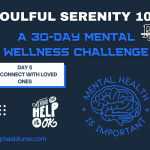
The holiday season is meant to be a time of celebration, joy, and togetherness. However, for many individuals, it can bring about feelings of sadness, loneliness, and even depression. Whether you’re grappling with holiday blues, Christmas depression, or depression during any festive occasion, it’s crucial to acknowledge these emotions and seek effective coping strategies. In this comprehensive guide, we’ll explore various ways to address and overcome holiday depression to ensure a more emotionally fulfilling and joyful holiday season.
Understanding the Challenge of Holiday Depression
Holiday depression, often referred to as seasonal affective disorder (SAD), is a type of depression that surfaces during specific times of the year, usually around the holiday season. Several factors can trigger or exacerbate this condition, including:
- Social Isolation: The expectation of being surrounded by loved ones during the holidays can magnify feelings of loneliness for those who are socially isolated or have strained relationships.
- Financial Stress: The holiday season often comes with the financial strain of gift-giving, travel expenses, and other festive costs, causing stress and anxiety for many.
- Unrealistic Expectations: The pressure to achieve a picture-perfect holiday with perfect happiness and harmony can lead to disappointment and depression when reality falls short.
- Loss and Grief: For individuals who have experienced the loss of a loved one or significant life changes during the year, the holidays can trigger profound feelings of grief and sadness.
- Seasonal Changes: Reduced daylight and colder weather can contribute to symptoms of depression for some individuals, known as Seasonal Affective Disorder (SAD).
- Comparison and Social Media: The prevalence of social media can intensify feelings of inadequacy as people compare their holiday experiences with carefully curated online portrayals.
- Overcommitment: The pressure to attend numerous parties, events, and gatherings can lead to exhaustion and increased stress, further exacerbating depression.
Now that we have a better understanding of the factors contributing to holiday depression, let’s explore practical strategies for coping with and overcoming these challenges.
Effective Coping Strategies for Holiday Depression
- Recognize and Accept Your Emotions: The first step in dealing with holiday depression is acknowledging your feelings. It’s perfectly normal to experience sadness or loneliness during this time. Avoid suppressing your emotions, as it can make them even more overwhelming.
- Seek Support: Reach out to friends, family members, or a therapist. Sharing your feelings and seeking support can provide a sense of relief and connection during the holiday season.
- Set Realistic Expectations: Understand that the holidays don’t have to be perfect. Set realistic expectations for yourself and the season. It’s acceptable to decline certain events or traditions that may add to your stress.
- Create New Traditions: If holiday traditions contribute to your distress, consider establishing new ones that align with your current circumstances and preferences. This shift can help divert focus from past disappointments.
- Prioritize Self-Care: Make self-care a priority during the holidays. This includes getting enough rest, maintaining a balanced diet, staying physically active, and engaging in activities that bring you joy and relaxation.
- Limit Exposure to Social Media: Be mindful of how social media affects your mental health. Take breaks from platforms that make you feel inadequate or anxious. Remember that what’s portrayed online may not reflect real experiences.
- Manage Financial Stress: Create a budget for holiday expenses and stick to it. Consider alternative gift-giving options, such as homemade gifts or quality time with loved ones, rather than expensive presents.
- Volunteer and Give Back: Helping those in need can provide a sense of purpose and fulfillment. Consider volunteering at a local charity or organizing a donation drive to support those less fortunate.
- Practice Mindfulness and Relaxation Techniques: Incorporate mindfulness meditation, deep breathing exercises, and progressive muscle relaxation into your routine to reduce stress and enhance emotional well-being.
- Plan and Prioritize: Plan your holiday schedule thoughtfully. Prioritize self-care activities, set clear boundaries, and allocate time for activities that bring you joy. This approach can help maintain balance during the festive season.
- Consider Professional Help: If your holiday depression persists or worsens, it may be beneficial to seek professional assistance from a therapist or counselor. They can offer tailored strategies and support.
- Stay Active: Regular physical activity has been shown to improve mood and alleviate symptoms of depression. Include exercise in your daily routine, even if it’s just a short walk or home workout.
- Connect Virtually: If you can’t be with loved ones in person, leverage technology to stay connected. Video calls, virtual gatherings, and online games can help bridge the gap and reduce feelings of isolation.
- Explore Light Therapy: For those affected by Seasonal Affective Disorder (SAD), light therapy, or phototherapy, can be an effective treatment. Consult a healthcare professional for guidance.
- Medication: In some instances, medication prescribed by a healthcare provider may be necessary to manage severe holiday depression symptoms. Always consult a medical professional before starting any medication.
Assisting Someone with Holiday Depression
If you’re concerned about a friend or family member experiencing holiday depression, here are some ways you can provide support:
- Listen Compassionately: Be a compassionate and attentive listener. Allow them to express their feelings without offering unsolicited advice or judgment.
- Offer Practical Assistance: Extend specific help, such as aiding with holiday preparations, running errands, or being a supportive presence. Sometimes, practical support can alleviate stress.
- Respect Their Boundaries: Understand that they may not want to partake in all holiday activities. Respect their boundaries and choices without imposing guilt or pressure.
- Encourage Professional Help: If their depression appears severe or persistent, gently encourage them to seek professional assistance. Assist in finding a therapist or offer to accompany them to appointments if needed.
- Share Resources: Provide information about resources, hotlines, or support groups that could be beneficial. Encourage them to explore available options.
- Stay Connected: Maintain regular check-ins with your loved one, even after the holiday season concludes. Depression can linger, so ongoing support is essential.
Overcoming Holiday Depression
The holiday season may pose emotional challenges for those dealing with depression, but with understanding, support, and self-care, it’s possible to uncover moments of joy and connection. Keep in mind that holiday depression is a common experience, and you’re not alone in your struggle. By implementing these coping strategies and seeking help when necessary, you can navigate the holidays with greater resilience and well-being. Whether you’re addressing Christmas depression, post-holiday blues, or depression during any holiday, there is hope for a brighter and more emotionally fulfilling festive season ahead.







